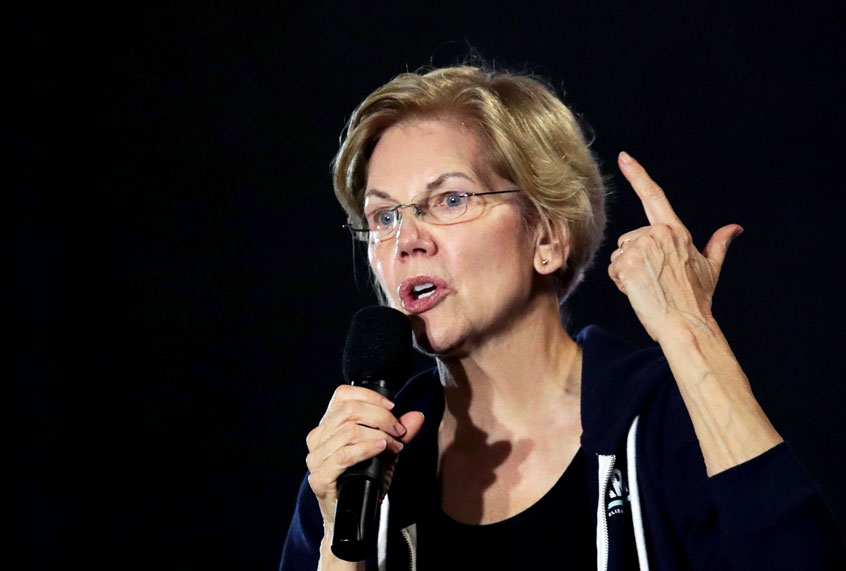As part of her quest to increase taxes on the wealthy, Sen. Elizabeth Warren, D-Mass., has taken aim at the billionaire in the presidential race who opposes her plan — and she targeted him on his own turf.
The presidential hopeful’s new spot, which she unveiled on Twitter, will air only once in New York, the city which businessman Michael Bloomberg ran as mayor, and only on Bloomberg TV, which he owns.
“I don’t believe that elections ought to be for sale,” Warren says in the ad. “And I don’t think as a Democratic Party that we should say that the only way you’re going to get elected — the only way you’re going to be our nominee — is either if you are a billionaire or if you’re sucking up to billionaires.”
Warren goes on to complain about members of the 1 percent who allegedly “call their billionaire friends and urge them to run for president” in order to avoid paying higher taxes as a photo of Bloomberg is displayed.
The ad shows Warren telling a cheering crowd on the campaign trail in Iowa, “Some people have figured out, you know, it would be a lot cheaper to spend a few hundred mil just buying the presidency instead of paying that 2 percent wealth tax.”
I guess some billionaires figured it'd be a lot cheaper to spend a few hundred million to buy the American presidency than paying their fair share in a #WealthTax so that everyone can succeed. I put an ad on Bloomberg TV to let them know—I'm not backing down from this fight. pic.twitter.com/cULpOZYKoh
— Elizabeth Warren (@ewarren) December 4, 2019
Warren, who has rejected donations from Wall Street and Silicon Valley in favor of small-dollar contributions, has made fighting economic inequality a signature issue of her campaign. Her website sells mugs from which you can drink “billionaire tears.” She was the first presidential hopeful to propose taxing not just the income of the wealthy but also their assets, such as stocks, bonds and real estate.
Her plan would impose a 2 percent annual tax on a family with wealth above $50 million and 6 percent on those with wealth over $1 billion. (Initially, Warren had proposed a 3 percent tax for families worth over $1 billion, but she bumped that to 6 percent when she released her plan to pay for Medicare for All.)
So far, 11 candidates in the 15-member Democratic primary field — including Tom Steyer, the other billionaire in the race — have expressed support for a wealth tax.
Since jumping into the race last week, Bloomberg has reportedly spent more than $57 million on TV ads, focusing on Super Tuesday states like California and Texas instead of the early nominating states of Iowa, New Hampshire, Nevada and South Carolina.
Bloomberg appears on track to overtake Steyer, who has spent roughly $60 million on ads since throwing his hat in the ring in July, according to CNBC. The former New York City mayor has also outspent his Democratic rivals on Google’s ad platform.
Other candidates have lamented both billionaire’s early access to campaign cash.
“When I watched TV last night, all I saw were two billionaires’ ads,” Sen. Amy Klobuchar, D-Minn., another presidential hopeful, said earlier this week. “The rest of us can’t afford to run ads like that. You just can’t simply allow wealthy people to come in and buy elections. I don’t think America looks at the guy in the White House and says, ‘Let’s find someone richer.'”
The ads have appeared to give Bloomberg a slight bump in support in the race. Recent polling data showed Bloomberg at 5 percent, or tied with Sen. Kamala Harris, D-Calif., who suspended her campaign earlier this week due to lack of funding.
Though he joined the race just days before Thanksgiving, Bloomberg’s campaign has already come under scrutiny.
Bloomberg News announced in November that it would not conduct in-depth investigations of Bloomberg — or any of his competitors for the Democratic presidential nomination.
“I don’t want all the reporters I’m paying to write a bad story about me,” Bloomberg said last December when asked how journalists at his news outlet would cover a potential Bloomberg bid.
Last year, Bloomberg said he would sell his media company if he ran for president — or put the company into a blind trust. Neither has happened.

